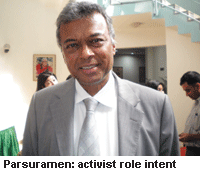 Armoogum Parsuramen is the new head of the United Nations Educational, Scientific and Cultural Organisation (Unesco, estb. 1945) in New Delhi, supervising this highly-respected body’s operations in India, Bhutan, Maldives and Sri Lanka.
Armoogum Parsuramen is the new head of the United Nations Educational, Scientific and Cultural Organisation (Unesco, estb. 1945) in New Delhi, supervising this highly-respected body’s operations in India, Bhutan, Maldives and Sri Lanka.
Beginning his tenure in the national capital in September with a flurry of activity, on November 16 Parsuramen flagged off Unesco’s 64th anniversary through a host of events throughout the month. Its director general Koichiro Matsuura flew to Delhi to celebrate National Education Day (November 11 — the birth anniversary of free India’s first education minister Maulana Abdul Kalam Azad), and together with prime minister Dr. Manmohan Singh and Union HRD minister Kapil Sibal released Paths to Peace: India’s Voice in Unesco — a collection of landmark speeches by Indian leaders.
A former minister of education of Mauritius (1983-95), Parsuramen is widely credited with conceptualising that country’s ten-year Education Master Plan (1991-2000) and is also the prime mover of the island republic’s compulsory school education legisl-ation. A former chairman of the Organisation of African Unity; chairman of the African ministers of education caucus, and of the Association for Development of African Education, prior to signing up with Unesco in 1998, Parsuramen also served as advisor to the World Bank’s special initiative for Africa. In 2004 he was appointed secretary of the Unesco executive board until he accepted his current India assignment.
“Education is Unesco’s top priority for this region and I am well aware that India’s challenges in education are huge. But Unesco intends to play an active role in helping India attain the UN’s Millennium Development Goal of achieving the mission of education for all by 2015,” says Parsuramen. In his opinion the Union government’s Free & Compulsory Education Bill is a bold step in the right direction. “But realising the education for all goal requires more than government effort. All sections of society should support and partner with the government,” he adds.
Outlining a plan to establish Asia’s first category 1 (i.e Unesco adminis-tered) institution in New Delhi to be named Mahatma Gandhi Institute of Education for Peace and Sustainable Development, Parsuramen says that New Delhi’s proposal to this effect has been accepted by Unesco. “It will be established on campus of the National University of Educational Planning & Administration. Construction work has begun and an administrative board is being constituted,” he says.
Calling for inter se cooperation between countries of the region to move forward to attain the UN’s millennium development goals, Parsuramen stres-ses the need for renewed non-partisan commitment from every country in the region. “As always Unesco is ready, willing and able to share its global development experience to infuse peace and progress in the hearts and minds of men,” he says.
Amen!
Autar Nehru (Delhi)